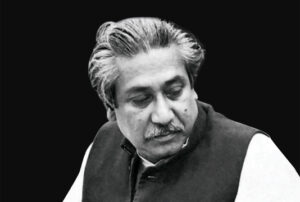Dr. M. S. Haq
I recently wrote an article on political reconciliations in Bangladesh. It was published in Bangladesh by the green watch (the online daily), the financial express, and the news today on 22 October 2013, 02 November 2013, and 06 November 2013 respectively. The article was also picked up by the google and others concerned.I pointed out in the article, among others things, “aggregate human environments in SAARC region have not yet, owing to several limitations, able to influence the external environment of human environments in Bangladesh for purposes such as creating, sustaining and promoting demand and supply for maximum productivity, minimum wastage (if not elimination) and maximum satisfaction in relevant areas.”. Further, I considered above situations as – one of the barriers to efforts towards accelerating developments of Bangladesh at the required rate; and an insufficiency that has been failing the country’s internal environment of human environments to benefit maximally from cross-fertilization of the external and the internal environments of human environments for accelerated developments therein.
In respect above, a few of the underlying assumptions – not discussed in that article – were – one, to help making SAARC more resilient (than that at present) so it could become more dynamic (than that at present) when it will come to dealing with developmental variables such as and as appropriate global interdependencies and competitions for maximum return on investment in relevant areas; two, to help making SAARC a hub of constructive pluralism at conceptual, operation and other levels so it could play a catalytic role in accelerating economic development especially, in member countries; three, to sensitize further SAARC members – particularly the powerful members, India and Pakistan, both are nuke weapons countries – about their lead accountability to people of the region when it comes to expediting culture of production and productivity to their maximum per capita benefit, as well as satisfaction; and four, to help transforming SAARC into a regional seat of peace and democracy so it could serve as antidotes to unnecessary militarization of the region and as mechanisms for collective security for member countries – similar to basement membrane (it acts as the anchor of epithelial cells for their attached sides – cells are organized into tissue) of the epithelial tissue of human body that provides protection to underlying tissue such as connective tissue.
One of the purposes of the article on reconciliations was to explore and exploit options – short, mid, long and other terms – for liberation of say Bangladesh from a variety of problems such as: those that have been arising out of, and in the course of, per cycle of national elections in Bangladesh since its independence; and those preoccupations of ordinary people of Bangladesh in areas say life, living, continuity and growth that have been depriving them of the right and informed voting decisions, to mention a few, to the advantage of politicians, political parties and others concerned. The bad news is – Bangladesh is currently facing a variety of similar and somewhat aggravated problems against the backdrop of upcoming national election in the country.
In the midst of above and other developments including expectations from India as a SAARC member – an article by Subhir Bhaumik on the politics of Bangladesh reportedly appeared in The Times of India on 01 November 2013 that is, after first publication of my article on political reconciliations in Bangladesh. The author has reportedly asked New Delhi to militarily intervene in Bangladesh to keep the Awami League in power so that the BNP and its fundamentalist allies do not assume power. Given contents, contexts and other things of the article plus those surrounding the article and fringe areas of the article – several things come to mind. A few of them have been presented here – not in the order of priority and importance but they are relative to time, space and other variables.
I. It is not clear at present as to what are causes, effects and causalities of publication of the article by The Times of India at the time when people of Bangladesh including those of civil society and political parties concerned, friends of Bangladesh such as the US, Japan, China and Canada, neighbors of Bangladesh such as India, and others concerned including the UN are apparently working towards political reconciliations in pursuits of a free, fair, credible and all inclusive election in the country. Also, at the time when Bangladesh is, in certain respects though, at an elevated level of internal instability. In an event, Mr. Bhaumik’s article represents the front face of aggregate behind-the-scene mindsets in pertinent areas, the article could then be a part of calculated attempt towards instigation of further communal politics in Bangladesh under the cover of India’s big media name, in the present case – The Times of India.
II. The author and the esteemed daily – under prevailing situations in Bangladesh – are probably aware of for example, as to what extent and how the statement and its dimension, as well as dissemination could help fuel a further division within Bangladesh along pro-India, anti-India and other lines, jeopardizing present day efforts of all concerned including India towards political reconciliations therein (Bangladesh), in the overall context of collective peace, security and development within say SAARC region.
It is expected The Times of India and concerned others will, from now onwards, behave more responsibly and more constructively (than that at present) because I believe global power has started disengaging itself from its central location and it is now increasingly apparent, building blocks of future global power could be built around regions and sub-regions with a view to bringing about the power related benefits, as well as sustainability nearer to inter alia people of the world – core sources and forces of that power – under a growing borderless, interdependent and reintegrating world and under growing regimes of Gene mechanics for common good of all concerned.
III. One of the motives of the article and its publication could be associated with efforts towards diverting attentions of people of India from challenges of the country’s upcoming election against the backdrop of increasing chances of Chief Minister Modi becoming the next Prime Minister of India through that election. It is expected inter alia Muslims and other minorities of India along with rest of the population of India will be able to enjoy full and legitimate freedom, liberty, equity, equality, rights, protection and satisfaction under ‘imminent’ all India regime of PM Modi. It is assumed change for better for all – in terms of say theory and practice, as proper – could elevate Modi from CM to PM and sustain him as the PM through future times, to mention a few. Good luck!
IV. The developments have created a variety of confusions among the people concerning official, non-official and other positions of India in matters of political reconciliations in Bangladesh.
Let us now focus briefly on the way forward. A few of the suggestions – relative to time, space and other variables – have been presented here. 01. India should make clearer its official position to people of Bangladesh via its (India’s) works, functions and contributions in areas of the election; 02. DGFI, NSI, MI, SB and others concerned should be extra alert when it comes to for example sensing, tracking and identifying possible involvements of all concerned in spreading images that are not conducive to maintenance of homeostasis (used medically) of Bangladesh for purposes such as keeping the country healthy on a sustainable basis; 03. Since the request for military intervention could not be taken lightly against the backdrop of for example a variety of present day rumors concerning Bangladesh and India relations and a kind of continuous tensions in Bangladesh-India borders, a further repetition of above or similar (or both) developments should lead to a thorough investigation into the matter in the overall national interest of Bangladesh – the demand of time is – Bangladesh should now be extra alert.
The last word: Bangladesh should accelerate efforts towards inter alia – drastic improvements in contents of loyalty for Bangladesh, as well as respect for people in domains of governance and public administration; elimination of harmful partisan politics and controllable wastage; and ensuring the right and affordable justice for all at all level at all time – through upcoming post-election government in the country. Upgrade initial conditions for ‘quality’ DNA transfers at intra, inter and other generational levels. God bless. (The author is inter alia Proponent of Gene mechanics)



